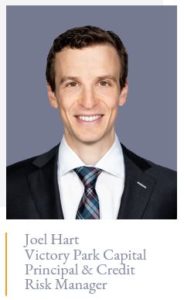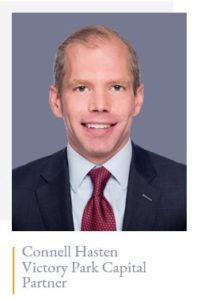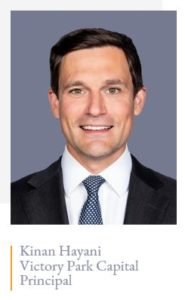VPC Viewpoints – September 2021
Announcement
Sep 16, 2021
VPC Viewpoints
Driving Value Creation through Commitment to ESG
Q&A with Joel Hart
Victory Park Capital (“VPC”) has a long history of commitment to Environmental, Social and Governance (ESG) considerations as part of our investment process and firm operations. We spoke with Joel Hart, who leads the firm’s risk management across VPC’s investment portfolio and oversees the integration of ESG in the firm’s operations.
investment process and firm operations. We spoke with Joel Hart, who leads the firm’s risk management across VPC’s investment portfolio and oversees the integration of ESG in the firm’s operations.
- When did VPC first establish its ESG policy, and why did the firm decide it was important to do?
VPC has always aimed to invest in businesses that we can be proud to support. In 2018 we launched a partnership with the International Finance Corporation (“IFC”), the private sector arm of the World Bank, to provide credit to businesses in emerging markets. Working with the IFC we realized the importance of formalizing our commitments to support upstanding businesses by establishing an ESG Policy. Since that initial policy in 2018, the policy and processes around how we integrate ESG into our investment strategies and firm operations have continued to expand in scope and sophistication. At the same time, the standards for ESG have continued to evolve both in our business and the global ESG ecosystem.
Today, VPC’s ESG policy is considered in the investment decisions we make across our organization. Part of the policy is clearly defining what we will and will not invest in, as there are certain industries and business practices that we simply will not support. Another important piece of the ESG program is understanding the risks and potential risks related to ESG and enacting processes to identify, mitigate and remediate any issues that do arise. Lastly, and perhaps most importantly, the ESG policy creates accountability throughout our organization and across our portfolio companies.
- What ESG factors does VPC consider when making investment decisions?
We approach ESG from a holistic perspective and try to understand the full range of potential ESG risks for any given investment. For each investment we underwrite, we identify the applicable ESG factors and map out a due diligence plan to understand the relevant risks and mitigants related to those factors.
One area we have invested heavily in is financial technology. With fintech investments, we tend to focus on the “Social” aspects of ESG, as those typically have the largest overall impact on the business. We look to invest in fintech companies that are supporting financial inclusion and have a positive impact on customers and other stakeholders. That means having products that are transparent and structured in a way that is fair to customers and promotes financial health. It also means having proper controls and systems in place to safeguard against harmful tactics or business practices.
- Tell us about VPC’s approach to monitoring ESG throughout the lifecycle of an investment. What does that process look like?
I think about our monitoring process in two ways. As part of our standard risk management process, we are very active in monitoring our portfolio companies across all dimensions, including ESG. We have frequent touchpoints with portfolio companies and receive extensive reporting to identify any potential issues. We also meet with our investment committee weekly to discuss any potential concerns and how to address or remediate them.
Equally important, we regularly engage with our portfolio companies about how they are thinking about ESG-related issues and share best practices. Given that we work with a lot of early stage, high growth companies, we aim to serve as a resource to our portfolio companies as they grow and develop their ESG practices over time.
- How has VPC evolved its ESG approach and processes over the past three years?
We have spent a lot of time building out the proper policies and processes to ensure that our ESG standards are applied appropriately and consistently across the entire organization. That includes, among other things, rethinking our processes, investment documentation and employee training. While myself and our Chief Operating Officer, Jeff Schneider, manage the day-to-day oversight of our ESG program, the overall process involves the entire firm and it is important to us that we have a culture that is “bought in” to ESG at every level of the organization.
In addition, as our firm has expanded into new investment categories, that often means re-evaluating how we think about ESG factors and risks in those specific areas. Over the past 12 months we have seen tremendous growth in e-commerce -related businesses, and those investments face unique ESG questions around acceptable manufacturing practices and supply chains. It is our responsibility to educate ourselves about the key issues for any potential investment, and it is important we set appropriate standards in these areas and discuss these issues with our partners.
- VPC recently signed the United Nations-supported Principles for Responsible Investment (PRI). What does this mean for the firm?
The PRI is the pre-eminent institution advocating for ESG issues to be at the forefront of investment decision-making and we are proud to be a signatory. It is a way for VPC to demonstrate that we take our responsibility to drive positive impact in our industry and in society very seriously and that we are committed to responsible investing for the long term.
+++
Private Credit for Insurers: VPC’s Differentiated Approach
Connell Hasten, Partner
When I joined Victory Park Capital almost three years ago to build and lead the firm’s insurance services platform, I never would have predicted the level of uncertainty that we would collectively experience as a result of the COVID-19 pandemic. However, what has remained constant throughout my time at VPC is our commitment to our clients and our ability to meet the unique investment needs of insurers.
throughout my time at VPC is our commitment to our clients and our ability to meet the unique investment needs of insurers.
In the prolonged current low-interest rate environment, private credit has become an extremely attractive asset class for insurers due to the compelling risk-adjusted returns, with no signs of allocations slowing down. In addition to investing in a credit product that maximizes risk adjusted yields, insurers also require a partner that has a full grasp of their regulatory framework.
Because of both our credit and our insurance expertise, we are able to provide custom investment solutions for insurers that maximize risk-based capital benefits and improve target return profiles. Our tailored approach enables us to support insurers of all sizes and our proprietary origination network consistently generates investment opportunities that fit insurers’ needs.
Having sat on the insurance side of the table, I have experienced first-hand how valuable it is to have an investment manager that not only can help meet risk-adjusted returns and capital efficiency targets, but also has the knowledge to be able to provide ancillary services as needed. Regardless of economic cycles and varying degrees of uncertainty as we move forward, our client-centric focus will continue to be our number one priority.
+++
Portfolio Company Spotlight: Bakkt
Kinan Hayani, Principal
Four short months after we launched our first special purpose acquisition company (SPAC), VPC Impact Acquisition Holdings (VIH), we identified and announced a business combination with a differentiated high-growth fintech company. The company has a strong position in one of the most well-funded and fastest growing areas of technological expansion, digital assets and crypto currency.
of the most well-funded and fastest growing areas of technological expansion, digital assets and crypto currency.
Bakkt is a trusted digital asset marketplace that enables institutions and consumers to buy, sell, store and spend digital assets. Launched in 2018 by Intercontinental Exchange, Inc., the company offers a secure, regulated platform for institutions, businesses and consumers to unlock new ways to participate in the digital economy.
For institutions that seek the infrastructure and capabilities to access new markets, products, and digital asset ecosystems, Bakkt provides greater regulatory compliance, better price discovery, and more effective risk management for institutions. For consumers, Bakkt’s scalable platform allows for the aggregation, transferability and monetization of cryptocurrencies, merchant offers, loyalty points and gift cards. And finally, for merchant partners, Bakkt enhances the value of merchant loyalty programs and the financial controls to reduce associated financial liabilities.
At VPC, we are excited about the future for Bakkt. With a strong management team and expanding ecosystem with high caliber partners, the company is poised to be a leading, long-term player in the large and growing digital asset ecosystem.
